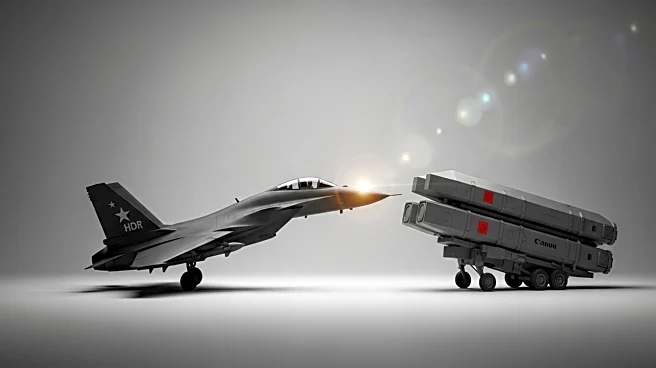What's Happening?
Leaked U.S. documents reveal that several Arab states have quietly expanded military cooperation with Israel, despite publicly condemning the ongoing conflict in Gaza. This collaboration, facilitated by the United States, involves senior military officials from Israel and six Arab countries, including Bahrain, Egypt, Jordan, Qatar, Saudi Arabia, and the United Arab Emirates. Meetings have been held in various locations such as Bahrain, Egypt, Jordan, and Qatar. The cooperation aims to address regional security concerns, particularly the threat posed by Iran and its allied militias. The documents highlight the creation of a 'Regional Security Construct' to enhance air-defense capabilities and counter Iranian influence. Despite the military collaboration, Arab leaders have publicly criticized Israel's actions in Gaza, describing them as genocidal and hostile.
Why It's Important?
The expansion of military ties between Arab states and Israel signifies a complex geopolitical shift in the Middle East. While these countries publicly denounce Israel's actions in Gaza, their behind-the-scenes cooperation suggests a pragmatic approach to regional security challenges, particularly the threat from Iran. This development could impact U.S. foreign policy and its role as a mediator in the region. The collaboration may also influence the dynamics of the Israeli-Palestinian conflict, as Arab states could play a role in supporting a peace framework. However, the tension between public condemnation and private cooperation may lead to diplomatic challenges and affect the trust between these nations and their populations.
What's Next?
The leaked documents suggest that the Arab states involved in the military cooperation with Israel may participate in deploying an international force to Gaza to train a new Palestinian police force. However, they have not publicly committed to deploying military forces. The U.S. plans to deploy 200 troops to Israel to support the ceasefire agreement, with potential involvement from Arab countries. The ongoing collaboration may lead to further military exercises and intelligence sharing, but the diplomatic sensitivities and public opposition could complicate future engagements. The situation in Gaza remains unresolved, and the role of Arab states in the peace process will be closely watched.
Beyond the Headlines
The quiet military cooperation between Arab states and Israel highlights the ethical and political complexities of regional alliances. While these countries seek to address security threats, their actions may be perceived as contradictory to their public stance on the Israeli-Palestinian conflict. This dual approach could lead to internal political challenges and affect public perception. The collaboration also underscores the influence of the U.S. in shaping regional security dynamics, as it continues to facilitate partnerships that may not align with public sentiment. The long-term implications of these alliances could reshape the geopolitical landscape in the Middle East.










